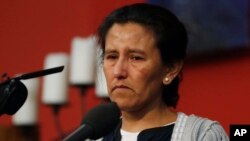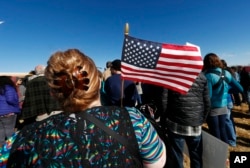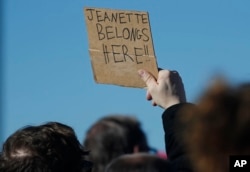Jeanette Vizguerra, a Mexican woman seeking to avoid deportation from the United States, sought a safe place in the basement of a church in Denver, Colorado, in mid-February.
This week, she filed her federal tax return.
On Thursday, she was named one of the "2017 Time 100" — Time Magazine's annual list of the 100 most influential people in the world.
"This award, hopefully, helps to take away the label, the tag, that those of us who are undocumented have — that we are criminals [and] that we don't contribute," Vizguerra said with the help of a translator during a news conference at the First Unitarian Church — the place she has been living in to avoid being arrested by immigration officials and deported.
"This has been a 20-year journey. A 20-year journey of building partnerships, creating spaces, opening new movements and new doors," Vizguerra said.
Arrested, jailed
Her legal team says her story is well-known. Reports say she was pulled over in 2009 for driving with expired registration tags. She was arrested for presenting fake documents and spent 23 days in jail.
Julie Gonzales, Vizguerra's legal representative, told the Los Angeles Times that her client pleaded guilty to a misdemeanor count of possessing a forged instrument.
Since then, Vizguerra has been in deportation proceedings. She checked in with immigration officials many times in the past, but after the election of a new president and seeing others check in only to get deported, she decided to find refuge in a church.
According to U.S. Immigration and Customs Enforcement guidelines, places like schools, hospitals, churches, synagogues and mosques are considered sensitive locations, which means ICE is still following its practice of not entering to arrest those living there.
ICE spokespersons have told VOA that enforcement actions at sensitive locations "should generally be avoided, and require either prior approval from an appropriate supervisory official or exigent circumstances necessitating immediate action."
Left in 2012
Reports say Vizguerra left the U.S. in 2012 to visit her mother, who died before she arrived. When she tried to return to Colorado, Vizguerra was arrested for entering the country illegally.
She was detained again, pleaded guilty, and was released pending check-ins with immigration officials. But under President Donald Trump's executive orders on immigration, she is now a priority.
The order signed in January makes undocumented immigrants with pending criminal cases priorities for deportation, whether they have been found guilty or not.
Former President Barack Obama prioritized deportations of those convicted of serious crimes.
Vizguerra's profile on Time's website was written by America Ferrera, an actor and activist whose description of the mother of four differs from the rhetoric used during the last presidential campaign.
"The current administration has scapegoated immigrants, scaring Americans into believing that undocumented people like Jeanette are criminals," Ferrera wrote. "She came to this country not to rape, murder or sell drugs, but to create a better life for her family. She shed blood, sweat and tears to become a business owner, striving to give her children more opportunities than she had. This is not a crime. This is the American Dream."
Worked as janitor, organizer
Vizguerra came to the United States from Mexico in 1997 with her husband and oldest daughter. She worked as a janitor and union organizer. She also was the founder of the Metro Denver Sanctuary Coalition.
"Jeanette moved to the U.S. to be a janitor, working as an outspoken union organizer and building her own company before becoming an advocate for immigration reform — a bold and risky thing for an undocumented immigrant," Ferrera wrote.
Her daughter is protected from deportation under Deferred Action for Childhood Arrivals, an Obama-era program. She also has three U.S.-born children, all under age 12.
Vizguerra said she was not expecting any award, did not know whether this recognition would help her case and did not expect anything from it. She does, however, hope that her selection by Time encourages people to think differently and more deeply about the labels being used by critics of past immigration policy.
"This award doesn't change anything. I'm committed to this fight … whether or not I have papers," she said.






